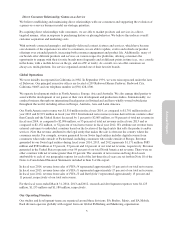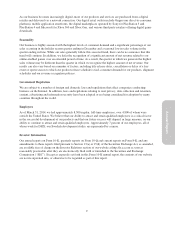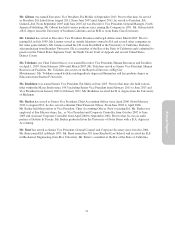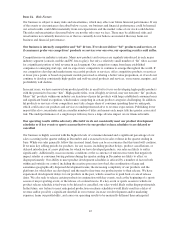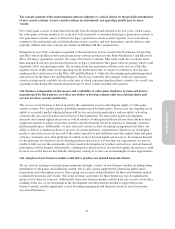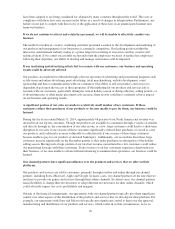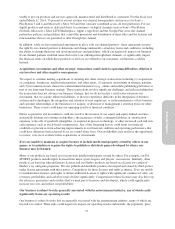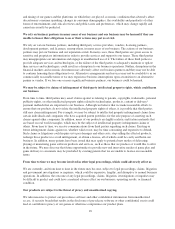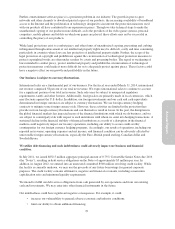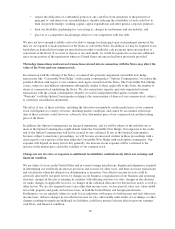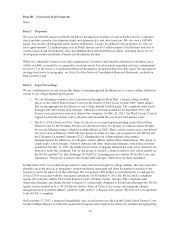Electronic Arts 2014 Annual Report Download - page 85
Download and view the complete annual report
Please find page 85 of the 2014 Electronic Arts annual report below. You can navigate through the pages in the report by either clicking on the pages listed below, or by using the keyword search tool below to find specific information within the annual report.
Annual Report
substantial legal liability. A perception that we do not adequately secure consumer information could result in a
loss of current or potential consumers and business partners, as well as a loss of anticipated revenues. Our key
business partners also face these same risks with respect to consumer information they collect and data security
breaches with respect to such information could cause reputational harm to them and negatively impact our
ability to offer our products and services through their platforms.
In addition, the rate of privacy law-making is accelerating globally, and the interpretation and application of
consumer protection and data privacy laws in the United States, Europe and elsewhere are often uncertain,
contradictory and in flux. It is possible that these laws may be interpreted or applied in a manner that is adverse
to us or otherwise inconsistent with our practices, which could result in litigation, potential legal liability or
require us to change our practices in a manner adverse to our business. As a result, our reputation may be
harmed, we could incur substantial costs, and we could lose both customers and revenues.
Our reputation with consumers is critical to our success as a company. Negative consumer perceptions
about our brands, products, services and/or business practices may damage our business and the costs
incurred in addressing consumer concerns may increase our operating expenses.
Individual consumers form our ultimate customer base, and consumer expectations regarding the quality,
performance and integrity of our products and services are high. Consumers may be critical of our brands,
products, services and/or business practices for a wide variety of reasons. These negative consumer reactions
may not be foreseeable or within our control to manage effectively, including perceptions about gameplay
fairness, negative player reactions to game content, components and services, or objections to certain of our
business practices. We value our consumers and expect to take actions to address consumer concerns as
appropriate, including actions that may result in additional expenditures and the loss of revenue. Negative
consumer sentiment about our business practices can also result in investigations from regulatory agencies and
consumer groups, as well as litigation, which, regardless of their outcome, may be damaging to our reputation
and harm our business.
If we release defective products or services, our operating results could suffer.
Products and services such as ours are extremely complex software programs, and are difficult to develop and
distribute. We have quality controls in place to detect defects in our products and services before they are
released. Nonetheless, these quality controls are subject to human error, overriding, and reasonable resource
constraints. Therefore, these quality controls and preventative measures may not be effective in detecting defects
in our products and services before they have been released into the marketplace. In such an event, we could be
required to or may find it necessary to voluntarily recall a product or suspend the availability of the product or
service, which could significantly harm our business and operating results.
Our business is subject to increasing regulation and the adoption of proposed legislation we oppose could
negatively impact our business.
Legislation is continually being introduced in the United States and other countries to mandate rating
requirements or set other restrictions on the advertisement or distribution of entertainment software based on
content. In the United States, most courts, including the United States Supreme Court, that have ruled on such
legislation have ruled in a manner favorable to the interactive entertainment industry. Some foreign countries
have adopted ratings regulations and certain countries allow government censorship of entertainment software
products. Adoption of government ratings system or restrictions on distribution of entertainment software based
on content could harm our business by limiting the products we are able to offer to our customers and
compliance with new and possibly inconsistent regulations for different territories could be costly or delay the
release of our products.
As we increase the online delivery of our products and services, we are subject to a number of foreign and
domestic laws and regulations that affect companies conducting business on the Internet. In addition, laws and
regulations relating to user privacy, data collection and retention, content, advertising and information security
15


